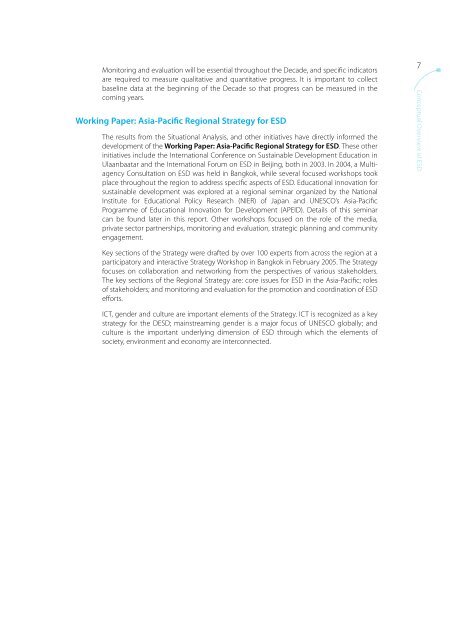A Situational Analysis - UNESCO Bangkok
A Situational Analysis - UNESCO Bangkok
A Situational Analysis - UNESCO Bangkok
Create successful ePaper yourself
Turn your PDF publications into a flip-book with our unique Google optimized e-Paper software.
Monitoring and evaluation will be essential throughout the Decade, and specific indicators<br />
are required to measure qualitative and quantitative progress. It is important to collect<br />
baseline data at the beginning of the Decade so that progress can be measured in the<br />
coming years.<br />
Working Paper: Asia-Pacific Regional Strategy for ESD<br />
The results from the <strong>Situational</strong> <strong>Analysis</strong>, and other initiatives have directly informed the<br />
development of the Working Paper: Asia-Pacific Regional Strategy for ESD. These other<br />
initiatives include the International Conference on Sustainable Development Education in<br />
Ulaanbaatar and the International Forum on ESD in Beijing, both in 2003. In 2004, a Multiagency<br />
Consultation on ESD was held in <strong>Bangkok</strong>, while several focused workshops took<br />
place throughout the region to address specific aspects of ESD. Educational innovation for<br />
sustainable development was explored at a regional seminar organized by the National<br />
Institute for Educational Policy Research (NIER) of Japan and <strong>UNESCO</strong>’s Asia-Pacific<br />
Programme of Educational Innovation for Development (APEID). Details of this seminar<br />
can be found later in this report. Other workshops focused on the role of the media,<br />
private sector partnerships, monitoring and evaluation, strategic planning and community<br />
engagement.<br />
<br />
<br />
Key sections of the Strategy were drafted by over 100 experts from across the region at a<br />
participatory and interactive Strategy Workshop in <strong>Bangkok</strong> in February 2005. The Strategy<br />
focuses on collaboration and networking from the perspectives of various stakeholders.<br />
The key sections of the Regional Strategy are: core issues for ESD in the Asia-Pacific; roles<br />
of stakeholders; and monitoring and evaluation for the promotion and coordination of ESD<br />
efforts.<br />
ICT, gender and culture are important elements of the Strategy. ICT is recognized as a key<br />
strategy for the DESD; mainstreaming gender is a major focus of <strong>UNESCO</strong> globally; and<br />
culture is the important underlying dimension of ESD through which the elements of<br />
society, environment and economy are interconnected.

















